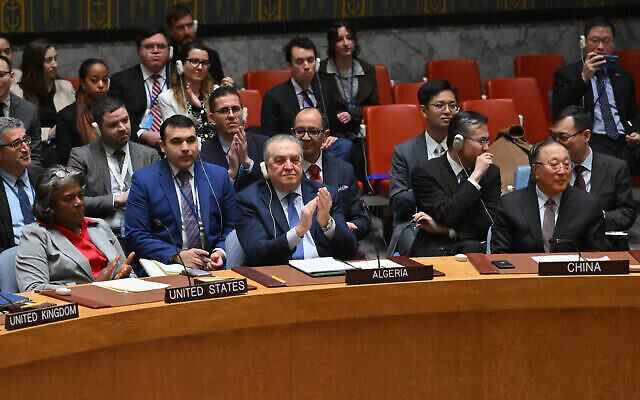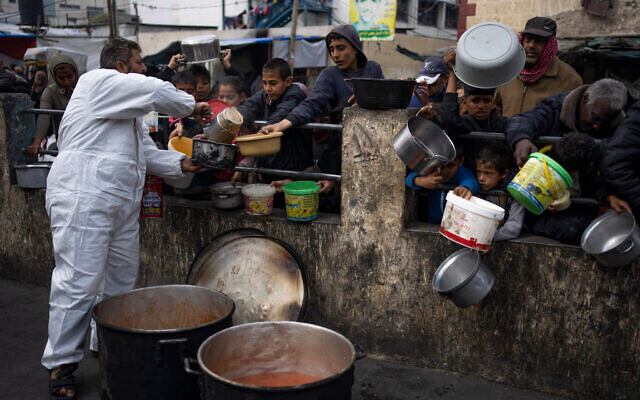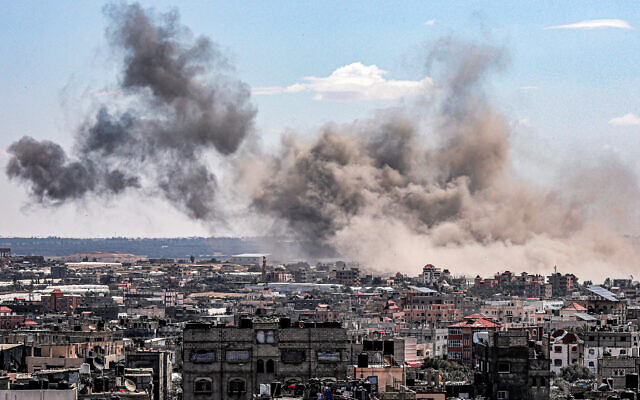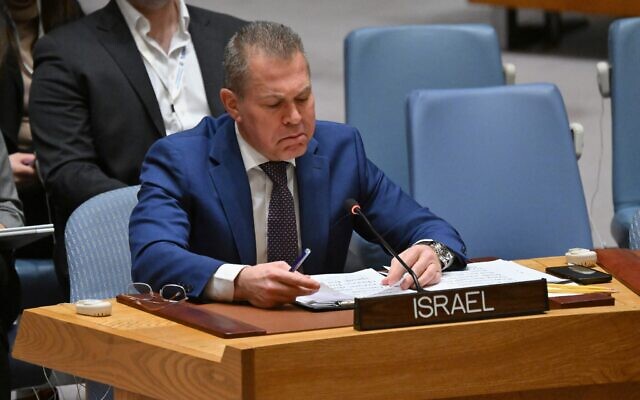UN Security Council adopts call for Gaza ceasefire, hostage release as US abstains
US argues resolution is non-binding ‘so there’s no impact on Israel’s ability to continue to go after Hamas’; indicates inclusion of call to free hostages led it to forgo veto

(THE TIMES OF ISRAEL) The United Nations Security Council passed a resolution on Monday demanding an immediate ceasefire between Israel and Hamas in the Gaza Strip and the immediate and unconditional release of all hostages, after the United States withheld its veto and abstained from the vote.
It was the first time that the Security Council passed a resolution demanding an immediate ceasefire in Gaza since the start of the war in October.
Resolution 2728 is understood to be non-binding and is not expected to have an immediate impact on the ongoing fighting in Gaza, as has been the case with previous Security Council resolutions that have been adopted in other conflicts that were subsequently ignored.
Israel is not expected to abide by the resolution’s call for an immediate ceasefire and Hamas is not expected to follow the demand for an immediate and unconditional release of the 134 hostages, though only the former is a party to the UN charter and failure to abide by its resolutions could lead to calls for sanctions. But with the US stressing that the resolution is not binding, it is highly unlikely that Washington would allow the council to sanction Israel for failing to abide by the measure.
However, it does mark a symbolic blow to Israel’s international standing nearly six months since Hamas’s October 7 onslaught and appeared to highlight a new low in ties between the US and Israel, with Prime Minister Benjamin Netanyahu announcing afterward that he was canceling plans to send a delegation to Washington at the administration’s request to discuss a potential ground invasion in Rafah.
The resolution passed by the UN Security Council “acknowledge[s]” the ongoing efforts to secure a hostage deal but does not directly link those talks to the Gaza ceasefire it is demanding.
A US resolution vetoed by Russia and China on Friday more directly tied the demand for a Gaza ceasefire to the talks brokered by Qatar, Egypt and the United States.

The US had previously vetoed resolutions calling for an immediate ceasefire, which contained no mention or linkage to the hostage talks.
The acknowledgment of those negotiations, while not directly linking them to the demanded ceasefire — along with the inclusion of both the ceasefire and hostage release demands in the very same sentence — appeared to be the compromise struck by Security Council members in order to pass the resolution on Monday.
The resolution “demands an immediate ceasefire for the month of Ramadan respected by all parties leading to a lasting sustainable ceasefire, and also demands the immediate and unconditional release of all hostages,” referring to the Islamic holy month that ends in roughly two weeks anyway.
The resolution’s cosponsors — Algeria, Ecuador, Guyana, Japan, Malta, Mozambique, South Korea, Sierra Leone, Slovenia, and Switzerland — sought to include the phrase “permanent sustainable ceasefire” into that line, but the US rejected the term and the final text uses the phrase “lasting sustainable ceasefire.”
While this was the first adopted Security Council resolution calling for a Gaza ceasefire, the body has passed two other resolutions that aimed to boost aid to Gaza and called for extended pauses in fighting.
The US has asserted that the new resolution is non-binding.
“It’s a non-binding resolution, so there’s no impact at all on Israel’s ability to continue to go after Hamas,” White House National Security Council John Kirby said in a press briefing. The position appears to be shared by South Korea and other members as well.
Algeria, Malta, Mozambique, Sierra Lione have all disputed this interpretation. But given that the US can block members from trying to sanction Israel for failing to abide by the resolution, Washington’s interpretation seems to carry more weight.
Accordingly, it demonstrates the highly limited influence the UN has when weighing into conflicts around the world.
One hundred and thirty-four hostages are still held by terror groups in Gaza since Hamas’s October 7 massacre, which saw thousands of terrorists burst into Israel, killing some 1,200 people and kidnapping another 253, mostly civilians.

US Ambassador to the UN Linda Thomas-Greenfield said she had to suffice with abstaining on the resolution, rather than voting in favor, chiefly because it did not include a condemnation of Hamas.
She maintained that the resolution was a reaffirmation of the US position that a ceasefire can only be reached through a hostage deal.
She reiterated the US position that a ceasefire could be reached immediately if Hamas were to release the hostages and urged Security Council members to condemn and put pressure on the terror group.
White House National Security Council spokesman John Kirby asserted that the US abstention “does not represent a shift in our policy,” indicating a degree of confusion over Netanyahu’s decision to present it as such.
“We’re very disappointed that [the Israeli delegation] won’t be coming to Washington DC to allow us to have a fulsome conversation on the viable alternatives to going in on the ground in Rafah,” Kirby told reporters in a briefing.

A US official separately briefing reporters branded Netanyahu’s decision to cancel the delegation to Washington as an “overreaction” and speculated that the move had more to do with Israeli domestic politics.
US President Joe Biden has no plans to call Netanyahu about the cancellation, nor did Netanyahu call Biden about it in advance, the official added.
The US had been planning to use the meetings with Netanyahu’s top aides on Wednesday to present alternative plans for a massive Israeli invasion of Rafah, which it opposes.
However, it was still able to discuss the matter with Defense Minister Yoav Gallant, who held meetings with senior White House officials on Monday.
For his part, Israeli Ambassador to the UN Gilad Erdan blasted the Security Council for adopting a resolution that did not explicitly condition a ceasefire on the release of the hostages.
“On the one hand, the resolution says that taking civilians hostage is in violation of international law, yet on the other hand — despite the fact that you know Hamas won’t listen to your calls and release the hostages — you demand a ceasefire,” Erdan said in remarks to the body after the vote.
Erdan said that the council’s failure to condition a ceasefire on the hostages’ release “not only isn’t helpful, but it undermines the effort to secure their release. It is harmful to these efforts because it gives Hamas terrorists hope to get a ceasefire without releasing the hostages.”
He then read aloud a text of a resolution that he said should have been adopted by the council — one that condemns human rights abuses such as hostage-taking and rape, and demands the terror group responsible to immediately cease its abuses.

Erdan revealed that this was actually the text of a resolution that the council adopted 10 years ago to condemn Boko Haram’s kidnapping of schoolgirls in Nigeria.
“Why can this council call on Boko Haram to lay down their arms, but the same can’t be demanded of the murderous Hamas terrorists?” Erdan asked. “Is the life of little baby [hostage] Kfir Bibas worth less than the life of a Nigerian child?
“Sadly, it’s for the same reason why you can condemn terror attacks in Russia and Iran, but not in Israel. To this council, Israeli blood is cheap. This is a travesty and I’m disgusted,” he added.
Meanwhile, Hamas hailed the resolution, calling for “a permanent ceasefire that leads to the withdrawal of all Zionist forces from the Gaza Strip, and the return of the displaced to the homes from which they left.”
The terror group also said in a statement that it was willing “to engage in an immediate prisoner exchange process that leads to the release of prisoners on both sides.”
Talks are ongoing, with Israel accusing Hamas of making unrealistic demands, including for any further hostage releases to be conditional on an Israeli commitment to end the war.

comments